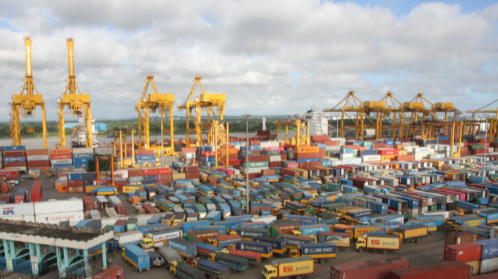Highlights
- Govt delays Ctg Port tariff hike for one month after business pushback
- First major fee increase in nearly 40 years, averaging 40-45%
- Business leaders demand six-month deferral and joint taskforce
The government has postponed the recently announced tariff hike on various services at Chattogram port for one month, following strong appeals from the business community.
“The temporary suspension is intended to ease pressure on exporters,” Shipping Adviser Brigadier General (retd) Sakhawat Hossain said at a workshop in the port auditorium today (20 September).
He explained that the port had planned the tariff increase to offset rising operating costs and fund ongoing projects, including the Bay Terminal.
Welcoming the postponement, Khairul Alam Sujan, director of the Shipping Agent Association and vice president of the Freight Forwarders Association, said currency-driven escalations had already pushed tariffs higher, even before the new hike.
“If the government wants to increase tariffs, it should be logical. We urged the shipping adviser to form a joint taskforce, including representatives from shipping agents and freight forwarders, to design a rational tariff structure,” he added.
The new tariff structure, covering a range of port and private inland container depot (ICD) services, increases rates by an average of 40%–45%. The Chattogram Port Authority (CPA) defended its decision, arguing that rates had remained unchanged for nearly four decades.
Traders, however, pointed out that they were already paying inflated charges before the hike. Their main concern is that CPA sets most tariffs in US dollars. In 2020, when the exchange rate was Tk85 per dollar, handling one TEU container at $43 cost Tk3,655. By 2024, with the dollar at Tk124, the same charge had risen to Tk5,332 – a jump of Tk1,677 in just four years.
Businesses urge six-month deferral
Business leaders at the workshop urged the government to defer the hike for at least six months and to cut some charges to remain competitive amid fresh trade challenges, including higher US tariffs.
They also criticised the move for raising rates without improving capacity or services and condemned the National Board of Revenue (NBR) for failing to enforce standards.
In response, CPA Chairman Rear Admiral SM Moniruzzaman said the port is operating beyond its designed capacity and remains dependent on tidal conditions and limited channel depth.
He said the port needs customs automation and legal reforms to clear long-stalled containers and accommodate projected trade growth over the next five years.
NBR Chairman Abdur Rahman Khan said all auctionable containers stuck at the port would be inventoried by the end of the month and auctioned promptly. He also announced plans to move 30 abandoned vehicles belonging to former MPs into the government transport pool.
Hike after 40 years
Chattogram port had increased tariffs across a wide range of services by an average of 40%, marking the first rise in nearly four decades. The new rates were to take effect on 15 September, following a government gazette notification issued on 14 September.
The last tariff revision at the country’s premier seaport was in 1986. After almost 40 years, the interim government approved the increase despite strong opposition from port users.
The CPA had proposed the hike in June, prompting protests from trade bodies and shipping agents. At a meeting convened by the shipping ministry on 25 August, port users argued that any tariff adjustment should remain within 10%–15%.
However, the meeting ended without a decision amid stakeholder opposition. Another round of discussions was held on 5 September, but the final decision largely followed the CPA’s proposal with no concessions.
The port currently collects tariffs under 52 service categories, 23 of which are directly affected by the new rates. Once implemented, the new structure would raise tariffs by an average of 41%. Because all charges are fixed in US dollars, taka depreciation would further increase costs, port users said.

